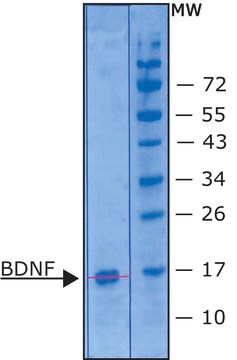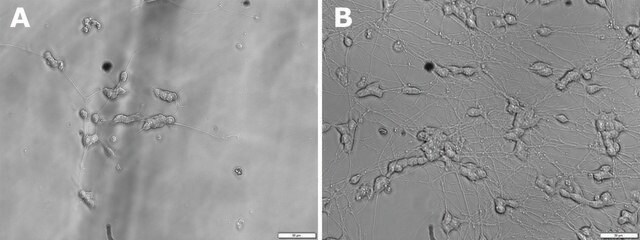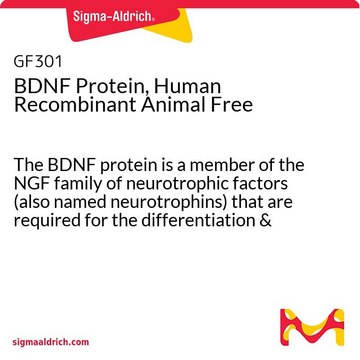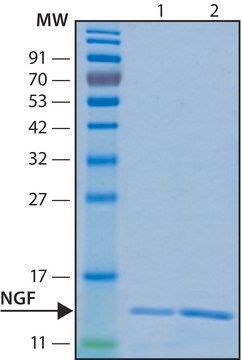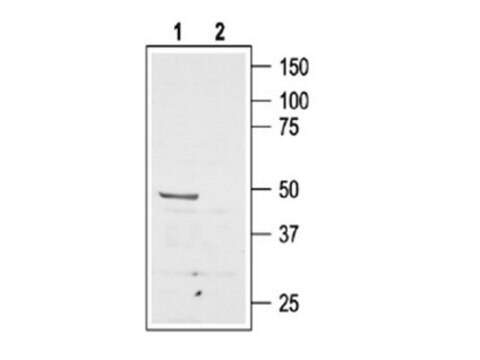GF029
Brain Derived Neurotrophic Factor, recombinant
Zaloguj sięWyświetlanie cen organizacyjnych i kontraktowych
About This Item
Kod UNSPSC:
12352200
eCl@ss:
32160405
NACRES:
NA.28
Polecane produkty
Opis ogólny
FUNCTION: SwissProt: P23560 # Promotes the survival of neuronal populations that are all located either in the central nervous system or directly connected to it. Major regulator of synaptic transmission and plasticity at adult synapses in many regions of the CNS. The versatility of BDNF is emphasized by its contribution to a range of adaptive neuronal responses including long-term potentiation (LTP), long-term depression (LTD), certain forms of short-term synaptic plasticity, as well as homeostatic regulation of intrinsic neuronal excitability.
SIZE: 247 amino acids; 27818 Da
SUBUNIT: Monomers and homodimers. Binds to NTRK2/TRKB.
SUBCELLULAR LOCATION: Secreted.
PTM: The propeptide is N-glycosylated and glycosulfated. & Converted into mature BDNF by plasmin (PLG) (By similarity).
DISEASE: SwissProt: P23560 # Defects in BDNF are a cause of congenital central hypoventilation syndrome (CCHS) [MIM:209880]; also known as congenital failure of autonomic control or Ondine curse. CCHS is a rare disorder characterized by abnormal control of respiration in the absence of neuromuscular or lung disease, or an identifiable brain stem lesion. A deficiency in autonomic control of respiration results in inadequate or negligible ventilatory and arousal responses to hypercapnia and hypoxemia. CCHS is frequently complicated with neurocristopathies such as Hirschsprung disease that occurs in about 16% of CCHS cases.
SIMILARITY: SwissProt: P23560 ## Belongs to the NGF-beta family.
SIZE: 247 amino acids; 27818 Da
SUBUNIT: Monomers and homodimers. Binds to NTRK2/TRKB.
SUBCELLULAR LOCATION: Secreted.
PTM: The propeptide is N-glycosylated and glycosulfated. & Converted into mature BDNF by plasmin (PLG) (By similarity).
DISEASE: SwissProt: P23560 # Defects in BDNF are a cause of congenital central hypoventilation syndrome (CCHS) [MIM:209880]; also known as congenital failure of autonomic control or Ondine curse. CCHS is a rare disorder characterized by abnormal control of respiration in the absence of neuromuscular or lung disease, or an identifiable brain stem lesion. A deficiency in autonomic control of respiration results in inadequate or negligible ventilatory and arousal responses to hypercapnia and hypoxemia. CCHS is frequently complicated with neurocristopathies such as Hirschsprung disease that occurs in about 16% of CCHS cases.
SIMILARITY: SwissProt: P23560 ## Belongs to the NGF-beta family.
Zastosowanie
Concentration range for most in vitro applications is 0.5 to 100 ng/mL. Responding cells are (partial list): Nerve, glial cells.
Postać fizyczna
Sterile filtered, lyophilized with no additives.
Przechowywanie i stabilność
The lyophilized powder, though stable at room temperature, is best stored desiccated below 0°C. Reconstitute in water to a concentration of 0.1-1.0 mg/mL. This solution can be diluted into water or other buffered solutions. Reconstituted BDNF should be stored in undiluted aliquots at -20°C for up to six months. Avoid repeated freeze/thaw cycles.
Oświadczenie o zrzeczeniu się odpowiedzialności
Unless otherwise stated in our catalog or other company documentation accompanying the product(s), our products are intended for research use only and are not to be used for any other purpose, which includes but is not limited to, unauthorized commercial uses, in vitro diagnostic uses, ex vivo or in vivo therapeutic uses or any type of consumption or application to humans or animals.
Ta strona może zawierać tekst przetłumaczony maszynowo.
Kod klasy składowania
11 - Combustible Solids
Klasa zagrożenia wodnego (WGK)
WGK 1
Temperatura zapłonu (°F)
Not applicable
Temperatura zapłonu (°C)
Not applicable
Certyfikaty analizy (CoA)
Poszukaj Certyfikaty analizy (CoA), wpisując numer partii/serii produktów. Numery serii i partii można znaleźć na etykiecie produktu po słowach „seria” lub „partia”.
Masz już ten produkt?
Dokumenty związane z niedawno zakupionymi produktami zostały zamieszczone w Bibliotece dokumentów.
Nasz zespół naukowców ma doświadczenie we wszystkich obszarach badań, w tym w naukach przyrodniczych, materiałoznawstwie, syntezie chemicznej, chromatografii, analityce i wielu innych dziedzinach.
Skontaktuj się z zespołem ds. pomocy technicznej